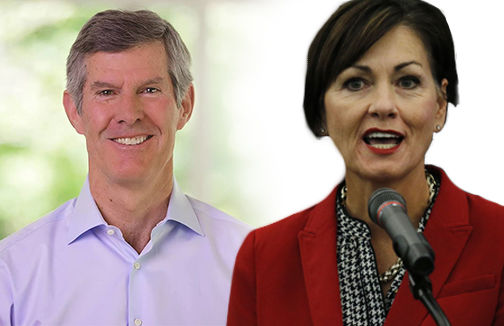Three takeaways from the final Iowa gubernatorial debate

Kim Reynolds and Fred Hubbell are facing off in the 2018 midterm gubernatorial election.
October 21, 2018
The final of three gubernatorial debates gave incumbent Republican Kim Reynolds and Democratic challenger Fred Hubbell a chance to finalize their arguments and tell voters why they should vote for them in November.
Here are three takeaways from Sunday’s debate:
State of economy main focus of debate by candidates, not moderators
As questions about the MeToo movement, public safety, climate change, immigration reform and school safety were asked by moderators, Reynolds and Hubbell took every chance they could to focus a majority of their time talking about the economy.
Reynolds talked about tax cuts passed during the last legislative session as well as recent news that the budget has a $127 million surplus.
“I want Iowans to keep more of their hard earned money, I cut taxes,” Reynolds said. “Fred, on the other hand, wants to raise taxes.”
Hubbell responded to claims the economy was in good shape by saying Reynolds has been fiscally irresponsible and that the economy is in a “yo-yo” effect.
“[The] first job of the governor should be to be fiscally responsible,” Hubbell said.
Hubbell said Iowa should review its tax credits and breaks for big businesses and the rich and give the rest of the tax cuts to the lower and middle class.
Hubbell and Reynolds disagree on mental health funding
Reynolds talked about a comprehensive mental healthcare bill that passed last legislative session, but Hubbell questioned if the bill has been sufficiently funded to create an impact.
“The governor’s bill has a lot of nice words in it, thats why a lot of people voted for it,” Hubbell said. “But there is no funding, no action: nothing has changed.”
Reynolds responded saying funding for mental healthcare is part of current discussions and there are currently ways it is being funded locally.
“She is just pushing costs and ideas down to local communities,” Hubbell said. “They don’t have the money to do these things, I have talked to these people all across the state, they are not implementing any of those suggestions in that bill because they don’t have the money for it and the state’s not giving them any money.”
Reynolds defends changes to collective bargaining, commits to supporting Iowa Public Employees’ Retirement System (IPERS)
When asked if her administration’s updates to collective bargaining were necessary, Reynolds said the changes brought taxpayers to the table and provided schools and local governments with more flexibility to manage their resources.
Hubbell said the changes were based in partisanship, not the state’s interests.
“They wanted to reduce the impact of labor unions in the state to strengthen the Republican party,” Hubbell said. “It had nothing to do with being good for our state and they actually violated the agreement that was put in place in the 1970s when they gave up the right to strike in return for getting collective bargaining. Now teachers and state workers don’t have the right to strike or collective bargain. It’s not fair.”
Hubbell also said if Reynolds won, she would take away IPERS for future teachers, which Reynolds denied.
“I hope all Iowans are tuning in because this gives me an opportunity to address this head on,” Reynolds said. “I am a strong supporter of IPERS.”















